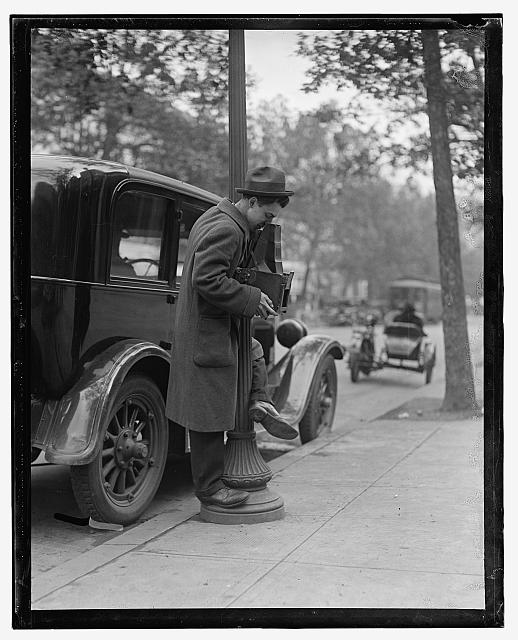 Unidentified photographer with camera, Library of Congress.
Unidentified photographer with camera, Library of Congress.
We talked about Warren and Brandeis’s case for a right to privacy. Specifically, we noted the following:
I said that we would profit from distinguishing the following from one another.
It is obvious that the boundaries between what is private and what is not are rapidly changing. There is a lot of information about ourselves that was formerly under our exclusive control but will not be in the near future. That fact makes many of us cranky and apprehensive: social change does that.
But while we’re clearly losing privacy, it isn’t obvious that everything that we’re losing is valuable or that we have a right to keep it private.
One thing that we discussed in talking about the first category, namely, what is private, is the relationship between anonymity and privacy. I commute to work on a series of trains. While my journey is in public, there’s a sense in which it’s private: no one knows who I am or the course of my complete journey. The fact that the phone company can track my journey through the phone in my pocket means that I’m losing this bit of privacy: now someone else really does know who I am and my complete itinerary.
Michael had an interesting case that also raised a question about the relationship between anonymity and privacy. Suppose someone published a letter I had written but without any of the information needed to link it to me. Is that an intrusion on my privacy or not? I think Warren and Brandeis would say that it is, since it is a communication of my thoughts without my permission (and I’m not a public official, my letter is not on a matter of public importance, and so on). But it’s a less clear-cut case since it is anonymous.
Warren and Brandeis were chiefly concerned with the private (or civil) law. This is the part of the law that individuals use to press claims against one another. Next week, we’ll read some Supreme Court cases that touch on privacy in Constitutional law. In those cases, the right to privacy governs the relationship between individuals and the state.
Then we’ll read an author who is skeptical of Warren and Brandeis’s approach, Judith Jarvis Thomson. She will argue that privacy should not have ever been separated from property and other rights in the first place.
This article is one of the most cited law review articles ever. Why did they write it? One popular story is that Warren was peeved about the way his daughter’s wedding was covered in the newspapers. However, since Warren’s daughter was seven years old at the time, this is not true.James H. Barron, "Warren and Brandeis, the Right to Privacy, 4 Harv. L. Rev. 193 (1890): Demystifying a Landmark Citation," Suffolk University Law Review 13 (1979): 893. (I had previously quoted the story about the wedding here; I deleted it when I learned it was false. - mjg December 19, 2019.)
Warren and Brandeis were also concerned that “the latest advances in photographic art have rendered it possible to take pictures surreptitiously” (211). They weren’t exactly wrong: that was possible.
But it would have been difficult.
 Unidentified photographer with camera, Library of Congress.
Unidentified photographer with camera, Library of Congress.